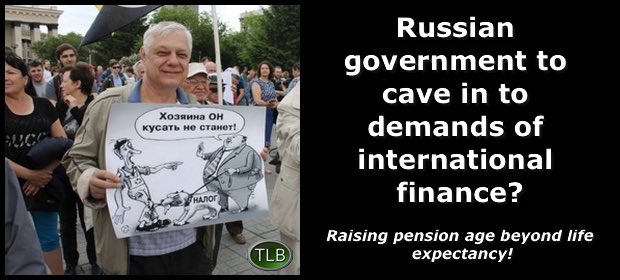
Outrage in Russia over pension reform
CLARA WEISS
Last Thursday, the Russian Labour Ministry submitted a bill to the Duma (parliament) that raises the retirement age for men to 65 from 60 and women to 63 from 55. The bill was intentionally submitted the first day of the FIFA World Cup, when Russia played against Saudi Arabia at the Luzhniki stadium in Moscow. The law, which still has several legislative processes to go through, is widely expected to be adopted in the fall. Ninety-two percent of the population oppose the measure, according to polls.
Because of low life expectancy for substantial segments of the population, the increase in the retirement age will mean that large numbers of Russia’s workers will not live long enough to see a pension. Although life expectancy, which dropped dramatically during capitalist restoration in the 1990s, has been rising over the past 18 years and now stands at 72.5 years, only 57 percent of Russian men live until the age of 65.
In 62 out of 85 regions of the Russian Federation, the average life expectancy for men is below 65 years. In 3 of them it is below 60. It is particularly low in many industrial jobs, including coal mining and the metallurgical and chemical industries. Women in Russia, whose life expectancy stands at 77.06 years, outlive their male counterparts by more than 10 years.
The pension reform bill will jack up the retirement age for a number of special-category workers who have hitherto been able to stop working sooner. This includes those employed in the far north, for whom the retirement age will increase from 50 for women and 55 for men to 58 and 60 years, respectively.
The average pension in Russia, 13,300 rubles ($210) per month, is so low that 17 million out of the 47 million pensioners in Russia at this point are still working, the majority of them in low-paying jobs. However, in many professions it is close to impossible to find employment after one’s mid-50s. The pension reform will mean that many older people, unable to find work and ineligible to receive a pension, will become unemployed and entirely dependent on their family and friends helping them financially. The unemployed receive virtually no state support in Russia.
The average salary in Russia is currently around 35,900 rubles ($567) a month, with real incomes having declined some 11 percent over the past 4 years. To support an additional family member on such poverty wages will push already poor families into destitution. According to official statistics, some 19.6 million Russians, about 13.4 percent of the population, now live in extreme poverty. They have to survive on 9,828 rubles (less than $174) a month. Millions more are living on the brink of extreme poverty, cannot afford to travel for vacation, or buy new clothes.
The raising of the retirement age, discussed for years within the ruling elites, is the most far-reaching assault on the living standards of the population since the restoration of capitalism in the 1990s. Part of the ongoing reshuffling of wealth from the population to the country’s super-rich oligarchy, the move is also part of the Kremlin’s overtures to international finance capital, which has long demanded that the government axe social expenditures.
The Russian government has remained markedly vague about its precise plans. However, it is widely believed that the measure is based on the proposal of the Center for Strategic Research, headed by  former finance minister Alexei Kudrin (pictured). Kudrin is a close confidant of President Putin. He is an important link between the presidential administration and more openly pro-imperialist forces actively working for a negotiated settlement between imperialism and Russian big business.
former finance minister Alexei Kudrin (pictured). Kudrin is a close confidant of President Putin. He is an important link between the presidential administration and more openly pro-imperialist forces actively working for a negotiated settlement between imperialism and Russian big business.
It remains unclear whether the retirement age will be raised gradually over the next 15 years, or all at once, as one deputy of the Communist Party of the Russian Federation recently argued.
Experts have called the increase in the retirement age a blatant act of “confiscation” of the population’s wealth. According to calculations by Maksim Krivelevich, who teaches at the School of Economics and Management of the Far-Eastern Federal State University, the state will effectively steal 1 million rubles ($16,000) from every working woman and 1.5 million rubles ($24,000) from every working man. The money, earned by workers over decades and paid into the government-run pension system, is being re-directed into the state budget, which is regularly used to bail out oligarchs and banks hit by the recent Western sanctions and economic crisis.
As of this writing, over 2.15 million people have signed a petition initiated by the Confederation of Labor of Russia (KRT) at the end of last week and addressed to the President Vladimir Putin, Prime Minister Dmitri Medvedev, and the Federal Assembly demanding that the pension “reform” not be enacted.
In comments on the petition, many workers expressed their outrage and hatred of the ruling oligarchy and the government. To quote just a few comments:
- “I was robbed by this country in 1991, in 1997, in 2008, I will not bear it any longer.”
- “There is money for war, soccer, and “Mercedes” cars for officials, but not for pensions?”
- “People will go on the barricades.”
- “This is a genocide of the population. Let’s first introduce an average pension of 13,000 rubles for the government and State Duma, let them live on it for just half a year…Where will this army of 60-year olds work? People will just drop out of life without any help…”
- “10 years remain before I retire. After this reform I won’t see my pension at all. And this after all the defaults, denominations, restructuring, liberalization of prices and other experiments that were done on us?”
- “I would like to see who any of you and the president would survive just one year on our miserable salaries, at age 65!!!!!”
- “We need a law on the complete confiscation [of wealth] from the nouveau riches.”
- “We are already giving the state too much of our salaries, we’re paying taxes, heat is getting more expensive and so on and so forth, and now they also want to raise the retirement age, that is after you retire there will be even less time to manage to experience some joy and satisfaction…We have natural resources after all, and receive billions by selling them!!! But everything is going into the hands of a few dozen oligarchs, Putin’s “friends”!!! Let’s oppose this outrage!!!!”
The petition sponsored by the KRT is an attempt to control popular anger, as the Russian ruling elite fears a social explosion over the effects of the pension reform. For similar reasons, the right-wing leader of the so called liberal opposition, Alexei Navalny, announced that he would organize rallies against the reform starting July 1. In reality, Navalny’s program is entirely hostile to the working class. He speaks for political and social forces that are responsible for capitalist restoration and are now seeking closer collaboration with US imperialism.
************
Original article
ER recommends other articles by World Socialist Website




